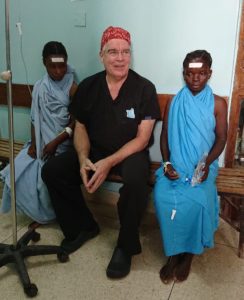Neuroendocrine cancer doesn’t stop surgeon from mending others around the world
 A red cape, instead of a white lab coat, would suit Steven Arrowsmith, MD. But he’s too modest to admit to being a hero. As one of only a handful of surgeons worldwide who has devoted his medical career to treating obstetric fistulas in undeveloped nations, Dr. Arrowsmith rescues women— medically, socially, and psychologically — who have been marginalized and penalized for injuries sustained in prolonged, obstructed labor.
A red cape, instead of a white lab coat, would suit Steven Arrowsmith, MD. But he’s too modest to admit to being a hero. As one of only a handful of surgeons worldwide who has devoted his medical career to treating obstetric fistulas in undeveloped nations, Dr. Arrowsmith rescues women— medically, socially, and psychologically — who have been marginalized and penalized for injuries sustained in prolonged, obstructed labor.
Within days of sitting down with NETRF for an interview at his hilltop home in Putney, VT, Arrowsmith flew off to rural Zambia to train physicians in fistula surgery. For the 17-hour flight, he booked a seat near the bathroom because he has small bowel neuroendocrine cancer with liver metastasis.
Diagnosed with NET in Nicaragua
During preliminary testing for a medical procedure in Nicaragua in 2017, Dr. Arrowsmith, who was watching an ultrasound screen during the exam, spotted 50 lesions on his liver.
“I knew instantly that there was only one thing that it could be and that was metastatic cancer and that I was in very, very big trouble,” said Dr. Arrowsmith. “With that many lesions in my liver, I thought I’d better get my affairs in order because I was looking at a couple of months max.”
Instead, Dr. Arrowsmith got another chance at happiness, watch the video to hear his story.
Life after NETs
Dr. Arrowsmith and his wife Erin Anastasi are learning as much as they can about NETs, attending NETRF patient and caregiver conferences, patient support groups, and researching NET specialists on NETRF’s doctor database.
Tips on working with doctors
A urologist by training, Dr. Arrowsmith shared insights from his experience as a physician and a patient. “The one thing I would recommend to other patients, which is probably the most important thing, is to make sure you have a good fit with your doc.”
Patients should not hesitate to switch doctors if things aren’t clicking, according to Dr. Arrowsmith. He assures patients that doctors want what is best for their patients and are not upset if someone leaves their practice. He also encourages people to shop around using resources like NETRF’s doctor database to find the right NET specialist. Dr. Arrowsmith routinely travels three and a half hours to find world-class specialty care.
He also encourages patients to advocate for themselves. Patients should feel comfortable expressing their needs, concerns, or dissatisfaction. Dr. Arrowsmith confirmed, “the squeaky wheel gets the grease in the health care system.”
Living with cancer
On how to live with neuroendocrine cancer, “You have to look for wisdom and inspiration where you can find it,” said Dr. Arrowsmith. He finds solace in nature and enjoys daily long walks in the woods with his dog. While hiking one day with his wife, they came across a boulder with a bronze plaque, inscribed with the poem, “The Peace of Wild Things” by Wendell Barry.
“It’s got a little zany phrase about animals not ‘taxing their lives with forethought of grief,’” he said. “It’s meant a lot to me as to how to order your life.”
The phrase has become Dr. Arrowsmith’s mantra, used to fend off fear, sadness, and anxiety. Fueling him to do what he describes as the best job in the world, helping thousands of women, who have been shunned by their husbands, families, and communities, find dignity and independence.
